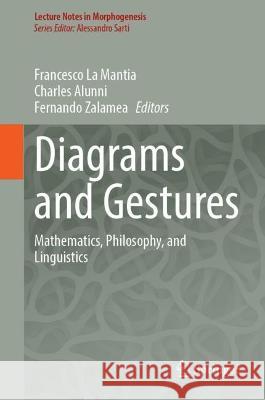Diagrams and Gestures: Mathematics, Philosophy, and Linguistics » książka
Diagrams and Gestures: Mathematics, Philosophy, and Linguistics
ISBN-13: 9783031291104 / Angielski
Diagrams and Gestures: Mathematics, Philosophy, and Linguistics
ISBN-13: 9783031291104 / Angielski
(netto: 690,08 VAT: 5%)
Najniższa cena z 30 dni: 655,41
ok. 16-18 dni roboczych.
Darmowa dostawa!
Drawing a line, and then another, and another. Go back from the lines to the movements they capture and see gestures in them: not spatial displacements, but modes of knowledge that pass through the exercise of the body. Discovering something new in a gesture: the line that contracts into a point or the point that expands into a zone, perhaps sinking into a hole. Thus experiencing a diagram: a becoming other inscribed in the novelty of the gesture and in the changes of the forms it shapes. This and much more is discussed in the essays gathered inDiagrams and Gestures. Resulting from trans-disciplinary work between mathematicians, philosophers, linguists and semioticians, the volume delivers an up-to-date account of the most valuable research on the connections between gesture and diagram. As one of the most important themes in contemporary thought, the study of these connections poses a challenge for the future: to elaborate a theory that is equal to new and stimulating research methodologies. We call this theory aphilosophy of diagrammatic gestures.
Drawing a line, and then another, and another. Go back from the lines to the movements they capture and see gestures in them: not spatial displacements, but modes of knowledge that pass through the exercise of the body. Discovering something new in a gesture: the line that contracts into a point or the point that expands into a zone, perhaps sinking into a hole. Thus experiencing a diagram: a becoming other inscribed in the novelty of the gesture and in the changes of the forms it shapes. This and much more is discussed in the essays gathered in Diagrams and Gestures. Resulting from trans-disciplinary work between mathematicians, philosophers, linguists and semioticians, the volume delivers an up-to-date account of the most valuable research on the connections between gesture and diagram. As one of the most important themes in contemporary thought, the study of these connections poses a challenge for the future: to elaborate a theory that is equal to new and stimulating research methodologies. We call this theory a philosophy of diagrammatic gestures.











